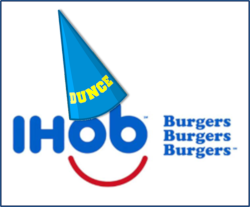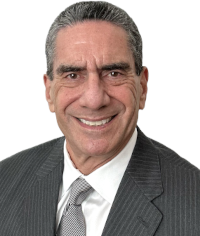 IHOP just pancaked itself.
IHOP just pancaked itself.
The iconic pancake house decided to become a worldwide burger joint, overnight, morphing into IHOb — then pretended that the name-change is temporary, to garner attention.
IHOb? The sound of it gives me the creeps.
Stupid move: conceived, approved, and executed by bunglers.
Julia Stewart, CEO of Glendale, California-based Dine Brands Global, which owns IHOP and Applebee’s, along with everyone involved in this decision, should wear a dunce cap.
People have been enjoying pancake breakfasts at IHOP since 1958, when it launched as the International House of Pancakes in Toluca Lake, California. Despite the name, patrons could enjoy burgers at lunchtime and beyond, and pancakes at any hour.
After 15 years, in 1973, the company shortened its moniker to IHOP, using a kangaroo image to reinforce the change and to communicate proximity to hungry customers.
As of 2015, there were 1,650 IHOP restaurants in 50 states and the District of Columbia — as well as in Bahrain, Canada, Dubai (UAE), Guatemala, Kuwait, Mexico, Puerto Rico, Saudi Arabia, The Philippines, and the US Virgin Islands.
US revenues, 70 percent of which come from breakfast, were $2.53 billion in 2009, growing steadily to $2.99 billion in 2014. From 2015 through 2017, however, revenues flattened, from $3.23 to $3.26 billion.
Confusion & Derision
Solution? Creatively energize breakfast revenues? No. Completely blow up the brand and the name.
Results? Confusion and derision.
Comparisons of the ob in the new logo with o.b. tampons abound. Scores of customers are expressing dismay and disappointment with the company on social media, some vowing to stay away. Burger competitors — Wendy’s, Burger King, and Whataburger — are mocking the new entrant.
Only amateurs unfamiliar with customers couldn’t have predicted this disaster.
As I described in Be Unique or Be Ignored, JCPenney, in 2011, had fallen flat. The company brought in Ron Johnson, from Apple, to be the new CEO. Overnight, he changed the name to JCP, completely revamped the stores, and attempted to replace traditional customers with upscale, hip ones. Revenues dropped 25 percent in 12 months, and Johnson was out after 17 months.
Ideas for change must come from customers — not sprung on them, especially overnight. Customers hate disruption. Federal Express, in 2000, became FedEx. Why? That’s what customers called it.
IHOP should have improved breakfast traffic by learning what customers wanted that they weren’t getting. The company could have gradually and imperceptibly increased lunch traffic without causing a stir.
But, to become a laughingstock and to repulse existing customers proves that IHOP knows nothing about branding and is a house of bunglers.
Parting Advice to CEOs
Never make wholesale, overnight changes to any company unless it is 6 minutes from death — and any CEO who allows it to sink that far should be fired.
Business changes should be incremental, gradual, continuous, and always validated as valuable to customers.
Will people ever learn? Of course not.
POSTSCRIPT #1: IHOP-IHOB Name-Change Was a Flop (06.19.18)
© 2018 Marc H. Rudov. All Rights Reserved.
About the Author

Marc Rudov is a branding advisor to CEOs,
producer of MarcRudovTV, and author of four books


